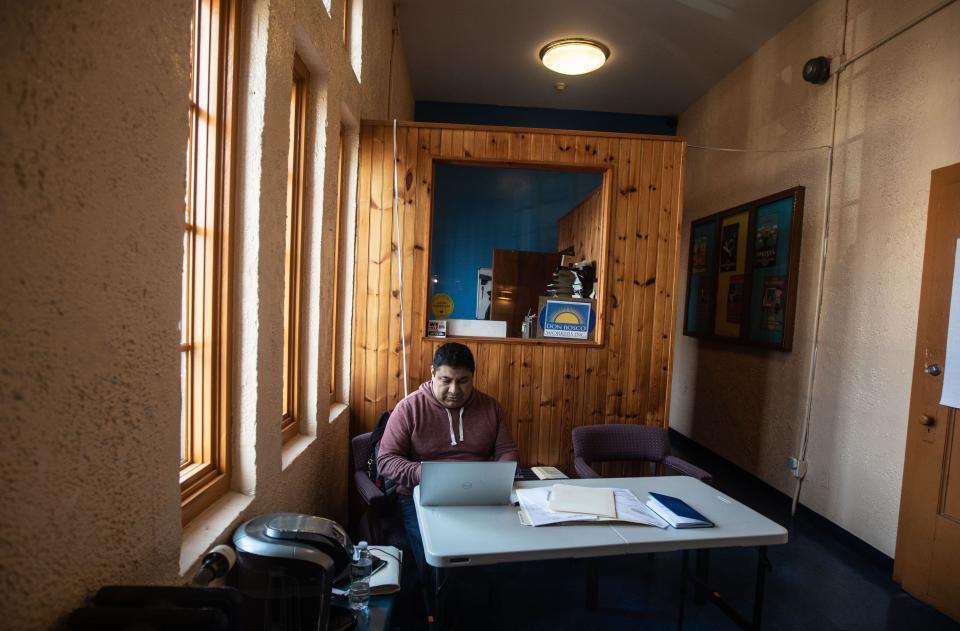New York passed an anti-wage theft law a decade ago. Theft still rampant, lawmakers say.
- Oops!Something went wrong.Please try again later.
Over a decade after a law was passed to curtail wage theft, New Yorkers still struggle to find justice for day laborers and other workers who have experienced wage theft, and the employers who withhold their earnings.
On Thursday, state lawmakers held a joint hearing in lower Manhattan to examine methods to address wage theft in New York State, which estimates have put at $1 billion in New York City alone.
“The situation is just untenable,” state Sen. Jessica Ramos, D-Queens, told USA TODAY Network New York outside of the hearing room. “This is millions of dollars that are missing from neighborhoods like mine.”
Lawmakers are again considering the Securing Wages Earned Against Theft, or SWEAT, bill, which Ramos has sponsored with Assemblymember Linda Rosenthal, D-Manhattan, who has pushed for the legislation for nearly a decade.
The hearing followed a USA TODAY Network New York investigation that examined how several day laborer centers and multiple workers across Westchester County filed criminal charges against one contractor for withholding tens of thousands of dollars of unpaid wages.
Separating fear, rhetoric from reality: What Title 42's end really means for New Yorkers

How often does wage theft occur?
It's unclear exactly how often wage theft occurs. But experts say it's rampant in low-wage, non-unionized industries such as construction, hospitality, nail salons and home care.
In 2010, the year before New York enacted a law heightening penalties and strengthening enforcement against wage theft, the nonprofit National Employment Law Project said New York City workers lost about $1 billion annually.
A 2021 report from the Economic Policy Institute, a left-leaning think tank, found that, across the nation, more than $3 billion in stolen wages was recovered between 2017 to 2020 by federal and state labor departments, prosecutors, and through litigation. During that four-year period, New York recovered nearly $130 million.
What do workers say?
Angelina Palafox’s tears flowed as she testified about her experience inside a Staten Island nail salon during the pandemic. Along with not being given face masks or proper gloves, the 43-year-old single mother told USA TODAY Network New York that the nail salon paid daily, not hourly, for $100. She’d regularly work 10- to 12-hour days in 2020.
Her employer withheld wages if she was paid in cash, she testified. When she tried to report this to the Internal Revenue Service, she said, the nail salon took away clients before laying her off. Her employer retained her apprentice license as a nail specialist. She’s worked as a manicurist for more than 20 years.
“I would like to do my job in a healthy and safe manner, and not sacrifice my health for the beauty of customers and the profits of the business,” she said.
What would the SWEAT bill do?
The legislation, currently stuck in committee, would impose liens on businesses found not to have paid workers, which would prevent businesses from moving assets to pay back workers’ wages. Even though workers may win a judgment in court, they may not see their earnings if employers register new companies, or they file for bankruptcy, both frequent methods of employers.
Earnings lossed: NY contractor accused of scamming workers. What's being done to prevent wage theft?
The Legislature did pass the SWEAT bill in 2019, but then-Gov. Andrew Cuomo vetoed it over concerns with constitutionality. He promised to take action on wage theft, but nothing came before he resigned. Gov. Kathy Hochul, meanwhile, formed a wage theft task force and has pushed to heighten criminal enforcement against wrongful employers.
The Department of Labor, the state agency that primarily handles wage theft claims, didn’t attend Thursday's hearing. Day laborer centers told USA TODAY Network New York they have struggled to address large wage-theft caseloads and need more support from the labor department.
“Unfortunately, in this post-pandemic world where wage theft is more rampant than ever,” said Ramos, the Senate labor committee chair, “we actually need the Department of Labor to fight against wage theft daily.”
In written testimony, state Labor Commissioner Roberta Reardon said the department has “enhanced our investigative capacity." The department’s Worker Protection and Labor Standards team oversaw investigations in 2022 that recovered $25 million in wages for nearly 18,000 workers. In the last decade, officials recovered and disbursed more than $360 million in stolen wages, she said.
“We will continue to fight tirelessly for the rights of workers, ensuring that our state’s workforce is treated with the dignity, respect and fairness they deserve,” Reardon wrote.
What do opponents say?
Representatives for New York City business groups have had constitutional concerns over due process under the law when it comes to imposing a lien on employers.
Andrew Rigie, executive director of the New York City Hospitality Alliance, a nonprofit association that represents some 4,000 bar, restaurant and nightlife owners in the five boroughs, called the SWEAT legislation “well-intended but misguided.”
“We don’t believe you try to address one injustice by replacing it with another injustice,” he said.
Besides hurting good employers, he added, bad employers will “find other ways to circumvent this law, leaving the law as a tool that will have negative consequences.”
Richard Blum, a staff attorney in the New York City nonprofit Legal Aid Society’s Employment Law Unit, objected to concerns over constitutionality. The liens, Blum said, make sure disputed assets, like wages owed, don't disappear.
“Nobody is removing due process from anybody,” he said.

What about criminal prosecution?
Policymakers have also considered how to address wage theft criminally, though a concern is whether doing so would affect workers getting the money they're owed.
“Too often when a company is caught stealing wages from its workers, it simply pays back what it owes and continues its exploitative conduct,” said Rachana Pathak, the chief of the Manhattan District Attorney’s newly formed Wage Protection Unit. “It is a cost of doing business.”
She outlined steps to address wage theft, including expanding the state's Victims Compensation Fund, the resource for people who have experienced a crime, to include those who have experienced wage theft. In February, when the DA’s unit formed, the office also established a $500,000 fund to help workers who have lost earnings due to wage theft.
Pathak also called for expanded definitions under criminal statutes for larceny, as well as a tiered charging system for employers, heightening charges if they are accused of stealing from more workers or if they have taken more wages from them.
Sen. Neil Breslin, D-Albany, has a similar bill, currently out of committee, to strengthen penal law against wage theft. Ramos has opposed more strict enforcement, citing concerns of targeting people of color over white people.
Eduardo Cuevas covers race and justice for the USA TODAY Network of New York. He can be reached at EMCuevas1@gannett.com and followed on Twitter @eduardomcuevas.
This article originally appeared on New York State Team: New York state still facing wage theft from laborers

